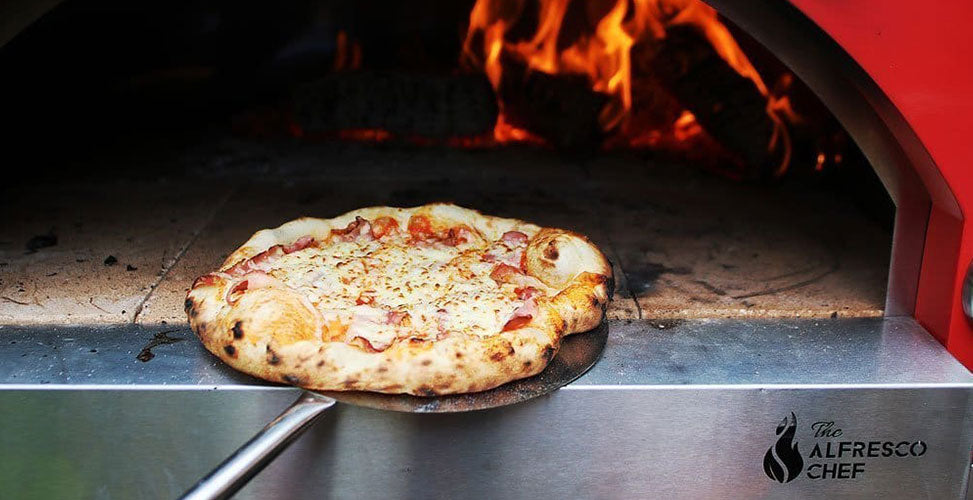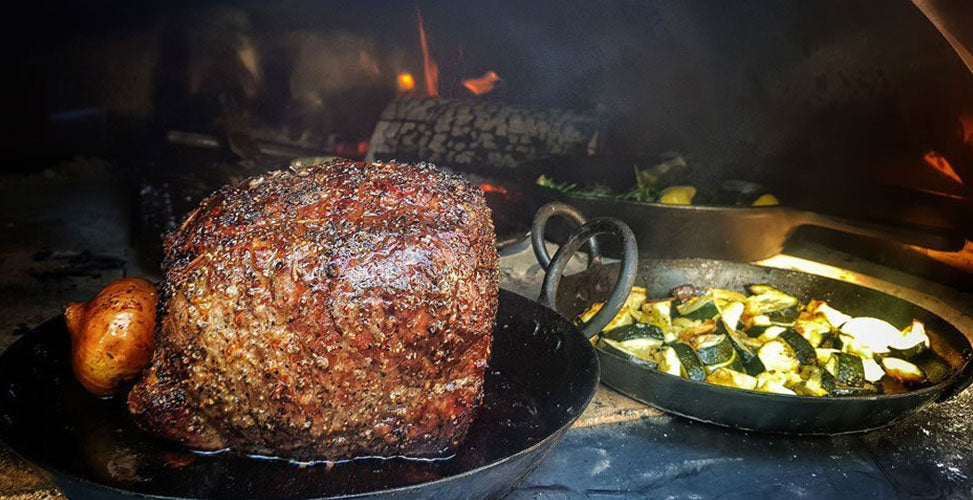Guides
Get weekly recipes and cooking tips by signing up to Alfresco Chef news

Follow the lighting instructions. Once the oven reaches 350°C and the wood has started to burn down to embers, use an ember rake (or brush) to push the wood to the back corner of the oven. If des...

Getting The Perfect Bake & Roast In Your Oven
Follow the lighting instructions until you achieve temperatures above your target cooking temperature. Once this has been reached, allow the wood to burn to embers and the temperature to drop to ...
FAQs
Have a question that isn't answered here? Feel free to contact us using the link below. No question is too small and we reply quickly!
Do you ship overseas?
At the moment, we only ship to the UK. See below for more info on delivery times.
UK Mainland | Royal Mail Delivery | 2 working days
Ireland / Northern Ireland | Tracked Delivery | 3 to 5 working days
Channel Islands / Isle of Wight / Isle of Man / Highlands | Tracked Delivery | 3 to 5 working days
Do the products come with a guarantee?
Alfresco Chef guarantees its wood fired ovens and their components to be free from defects in materials and workmanship for up to 3 years. Check out our Warranty page for more info on this.
What makes your wood-fired ovens different from conventional ovens?
Our wood-fired ovens offer superior heat retention, faster cooking times, and the ability to reach much higher temperatures than conventional ovens. They also impart a distinct smokey flavour (subject to the fuel used) to food and allow for versatile cooking methods.
Can I use a wood-fired oven for more than just pizza?
Absolutely! While pizzas are popular, wood-fired ovens are versatile and can be used for baking bread, roasting meats and vegetables, grilling, and even slow-cooking stews. Refer to our blog for more info - What More Can I Cook?
How much space do I need for a wood-fired oven?
Space requirements depend on the model. Our smallest countertop models require little space as is portable with small legs. While larger freestanding models will need more space (BBQ sort of size). Refer to our oven comparison for all sizes.
What type of wood should I use in my oven?
Hardwoods like oak, maple, or fruitwoods (apple, cherry) are ideal. Avoid using softwoods or treated lumber, as they can impart unpleasant flavours and potentially harmful chemicals. TIP: Ensure all fuel, logs and kindling is as dry as possible before use.
How long does it take to heat up a wood-fired oven?
Heating times vary by model and desired temperature. On average, it takes about 15-20 minutes to reach pizza-cooking temperatures. Though if you use a fire lighter times can be reduced.
How do I clean and maintain my wood-fired oven?
Regular maintenance includes removing ash after each use, occasionally cleaning the oven floor with a brush, and checking for any cracks or damage. We provide detailed care instructions with each oven.
What temperatures can your ovens reach?
Our ovens can reach temperatures up to 1000°F (538°C), with most cooking done between 500-900°F (260-482°C). It is not advised to go hotter than this, though this is certainly possible. Higher temperatures than this can cause damage.
How energy-efficient are wood-fired ovens?
Wood-fired ovens are highly efficient due to their excellent heat retention. Once heated, they can maintain cooking temperatures for hours with minimal additional fuel. An example, our Naples oven will be able to cook 10 pizzas with 5-6 logs and maintain heat of 350C+ for hours.
How can I get support if I have issues with my oven?
Our customer support team is available via phone, email, and chat. Please do email us at info@thealfrescochef.co.uk
How should I cure (or season) my oven before use?
When you first buy a wood-fired oven, it's important to properly season it before use. This process, also known as curing, helps protect the oven materials, improves its performance, and prepares it for cooking. Here's a general guide on how to season a new wood-fired oven:
Clean the interior:
- Remove any debris or dust from manufacturing and shipping.
- Wipe down the interior with a damp cloth.
Start with small fires:
- Begin with 2-3 small fires over 2-3 days.
- Use kindling and small pieces of hardwood.
- Keep these fires burning for about 1-2 hours each.
This gradually heats the oven and starts to dry out any moisture.
Gradually increase fire size:
- Over the next few days, slowly increase the size of your fires.
- Burn for longer periods, around 3-4 hours each day.
- Aim to raise the oven temperature each day.
High-temperature curing:
- After about a week of gradually larger fires, build a larger fire.
- Aim to get the oven temperature to around 700-900°F (370-480°C).
- Maintain this temperature for several hours.
Apply oil to the cooking floor (for some ovens):
- Once the oven has cooled slightly but is still warm, apply a thin layer of flaxseed oil or another high-temperature cooking oil to the oven floor.
This helps create a non-stick surface and protects the material.
Final high-heat burn:
- After oiling, do one more high-temperature burn to set the oil.
Let it cool slowly:
- Allow the oven to cool down naturally after each firing.
Important notes:
Be patient. Proper seasoning can take 1-2 weeks.
Never use water to cool down the oven, as this can cause damage.
Ensure proper ventilation during this process.
